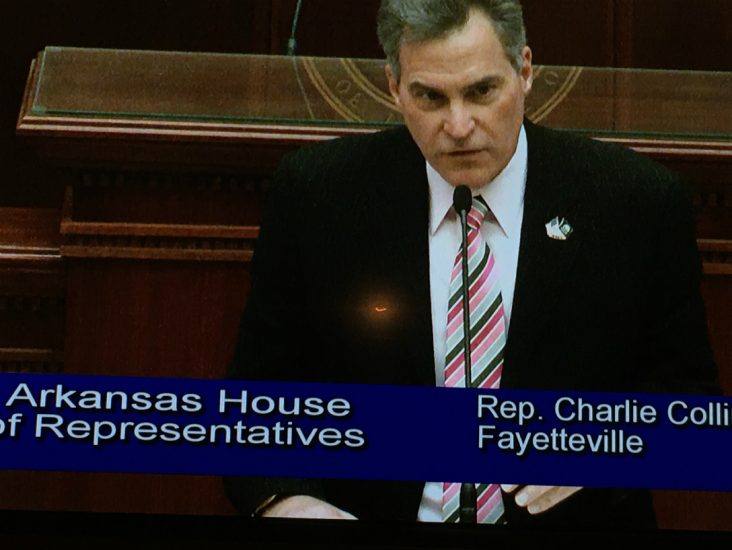House passes Rep. Collins’ campus concealed carry bill
by February 2, 2017 3:04 pm 570 views

A bill requiring Arkansas’ colleges and universities to allow staff members with concealed carry permits to carry their weapons on campus passed the House of Representatives on Thursday (Feb. 2) and now moves to the Senate.
The bill passed, 71-22, with one voting present.
House Bill 1249 by Rep. Charlie Collins, R-Fayetteville, eliminates an opt out provision contained in legislation passed in 2013. Under that law, higher education institutions could allow their staff members to carry a weapon, but they also could opt out of allowing them to do so. All of the state’s colleges and universities opted out.
If the legislation passes, students would not be able carry a firearm on campus, and guns could not be stored in dorms by anyone or carried in a college day care center. The bill would not change current law, which says that concealed weapons cannot be carried into bars or sports venues. The bill includes a number of exceptions where guns could not be carried, including at UAMS and the Clinton School of Public Service. Exceptions for all higher education institutions include formal employee grievance hearings and special events if enough law enforcement officers are present.
Before the vote, Collins laid out his case before legislators, starting by reading a list of shootings that are occurring despite advances in enforcement, policies and training.
“Only a fool would suggest that concealed carry holders replace law enforcement, and certainly not this fool. This is an ‘and’ story,” he said.
Collins told legislators that a study by the Secret Service and the Department of Education created a profile of mass killers. They are not acting spontaneously. They cannot be identified in advance. Their motive is to produce massive grief so the media will share their perceived injustice with the rest of the world.
“These people are planners,” he said. “Thy are plotters. They are methodical. They are not out of control with emotion. They are cold and calculating.”
Collins argued that the law would deter those people from going on a rampage on a college campus because the plotter would know that someone there could stop him.
Collins said studies have shown that despite prompt responses, most attacks were not stopped by law enforcement but instead by administrators, educators, students or the attacker himself.
He asked if the cure would be worse than the disease in that the law would lead to more deaths than it would prevent. He answered the question by saying the state’s concealed carry permitting process is very good and provides permits only to holders who want it for self-defense.
Rep. John Walker, D-Little Rock, asked if permit holders would face more liability concerns. Collins said they already face liability concerns. He said college campuses currently face higher liability because they have chosen not to take advantage of the 2013 law.
Rep. Greg Leding, D-Fayetteville, spoke against the bill, saying he represents the University of Arkansas and that the bill is opposed by the majority of the school’s students, parents, faculty, staff, board of trustees, the athletic department, the University of Arkansas Police Department and the Fayetteville Police Department.
He said the study Collins referenced was conducted many years ago and that schools are now better prepared to respond to these incidents. He referenced a Johns Hopkins study that found that most mass shootings over 50 years occurred where guns were allowed. He said his campus and all campuses are opposed to the bill.
